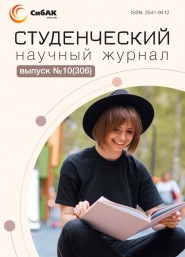Статья опубликована в рамках: Научного журнала «Студенческий» № 10(306)
Рубрика журнала: Педагогика
Скачать книгу(-и): скачать журнал часть 1, скачать журнал часть 2, скачать журнал часть 3, скачать журнал часть 4, скачать журнал часть 5
PEDAGOGICAL CONDITIONS OF PATRIOTIC EDUCATION OF PRIMARY SCHOOL CHILDREN
ПЕДАГОГИЧЕСКИЕ УСЛОВИЯ ПАТРИОТИЧЕСКОГО ВОСПИТАНИЯ МЛАДШИХ ШКОЛЬНИКОВ
Щендрыгина Мария Романовна
студент, кафедра теории, педагогики и методики начального образования и изобразительного искусства, факультет дошкольного, начального и специального образования, Белгородский государственный национальный исследовательский университет,
РФ, г. Белгород
Богачев Роман Евгеньевич
научный руководитель, канд. фил. наук, доц., Белгородский государственный национальный исследовательский университет,
РФ, г. Белгород
ABSTRACT
The article is devoted to the issues of patriotic education of younger schoolchildren, focusing on the importance of this process in the formation of a child's personality. Three key pedagogical conditions that contribute to successful patriotic education are considered: active participation in leisure and extracurricular activities, the creation of mini-museums and the interaction of all subjects of the educational process (students, teachers, parents). The description of various forms and methods of work, such as conversations, events, excursions and projects, demonstrates the importance of an integrated approach in fostering civic consciousness and love for the Motherland among the younger generation.
Keywords: patriotic education, primary school students, leisure, extracurricular activities, mini-museum, interaction, civic responsibility, culture, educational process, history of native land, patriotic feelings, civic position, events, excursions, traditions, family values, cultural heritage, social actions, raising children, sense of pride, personality development, school education, active participation, historical memory, local history, project activities.
Patriotic education is an important aspect of personal development, especially in primary school age. During this period, the foundations of worldview, morality and civic responsibility are laid. The effectiveness of patriotic education of primary school students can be significantly increased through targeted work carried out through familiarization with their native land. To do this, it is necessary to take into account a number of pedagogical conditions that will ensure the successful introduction of patriotic values.
The first and one of the most important conditions is the active involvement of schoolchildren in leisure and extracurricular activities. A variety of forms of work allows children to gain positive experience in participating in events that promote patriotic education.
The main forms include:
Conversations on topics related to patriotism, civic duty and historical feats of the people. For example, conversations "What does it mean to be a patriot of modern Russia?" and "The feat of the people will live for centuries" will help schoolchildren realize the value of their country and be proud of its achievements.
Individual classes, such as "I am a citizen and a patriot," develop an active civic position in primary school students.
Events and competitions: holidays dedicated to Victory Day or the history of their region contribute to the development of a sense of pride. The "Hero of My Family" competitions create an opportunity for children to introduce their relatives who have been awarded for their service to the Motherland.
Games and quizzes complement the program and help to acquire knowledge in an interactive form. For example, the "Symbols of Our Country" classes are aimed at familiarizing with national symbols.
Excursions to historical sites help teenagers better understand their past and deepen their patriotic perception. Trips, such as "A Walk Around the City Center," broaden their horizons and introduce the history of their native land.
The second popular condition is the creation of a mini-museum in the school space. It gives students the opportunity to become more deeply acquainted with the history, culture, and traditions of their small homeland. The purpose of creating a cultural space is to develop love and interest in the history of their region in primary school students. Main objectives: expanding knowledge about the small homeland, improving the ability to work with information, patriotic education through familiarization with cultural heritage.
A mini-museum provides an opportunity for students to accumulate knowledge about their region, which over time strengthens their identity and civic consciousness. Conducting excursions to real museums, for example, an art or historical and local history museum, will create a solid foundation for a future mini-museum.
The third condition is the interaction of all subjects of the educational process
The effectiveness of patriotic education increases significantly with the active cooperation of students, teachers and parents. The interaction of all participants in the process allows you to create a single educational space filled with patriotic content.
It is recommended to periodically hold joint events, such as memorial events and ceremonial events in which students, parents and teachers can participate. For example, the campaign "We remember! We are proud!" or "Victory Banner" are aimed at forming a single patriotic consciousness.
Another useful form of interaction can be parent-teacher meetings with a discussion of the significance of patriotism in the history of the country. Class hours dedicated to cultural heritage also help bring parents and schoolchildren closer together, forming respect for their native culture and history in children.
Conclusion
Thus, the process of patriotic education of younger students will be most successful if they actively participate in leisure activities, create mini-museums and interact with all subjects of the educational process. These methods not only enrich children's knowledge, but also form civic responsibility and patriotic feelings in them, contributing to the formation of a harmonious personality ready to serve their Fatherland.
References:
- Ovchinnikova N.P. The idea of patriotism and the Fatherland in the history of Russian pedagogy / N.P. Ovchinnikova // Pedagogy. - 2007 - No. 1 -pp. 93-101.
- Pashkevich I.A. Patriotic education: a system of work, planning, lesson notes, lesson designs / I.A. Pashkovich // Volgograd. - 2014.
- Rozhkov S. Educating patriots: patriotic education in school / S. Rozhkov // Pedagogical news. - 2003. - No. 12. - p. 7.


Оставить комментарий